
Location: 67 Adelaide Street East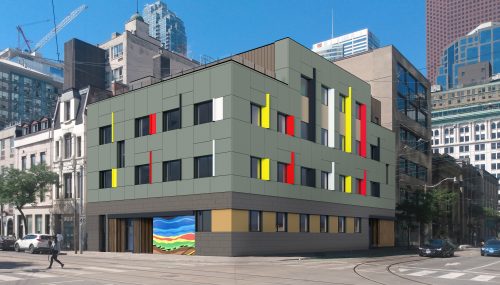
Anticipated client group: Indigenous (First Nations, Inuit, Métis) men
Number of expected beds: Up to 75 beds
Tentative Opening Date: 2025
Service operator: Na-Me-Res (Native Men’s Residence)
In 2018, in response to increased demand for shelter services, City Council directed Toronto Shelter and Support Services (formerly Shelter, Support and Housing Administration) to expand the number of permanent new shelter beds in Toronto by 1,000. In 2020, this funding was changed to include both housing and shelter projects and renamed to Housing & Shelter Infrastructure Development (HSID) project. 67 Adelaide Street East was chosen as a shelter site as part of this Council direction and to provide temporary accommodation and related support services that assist people to move into housing.
Please see Na-Me-Res Letter from Councillor Wong-Tam.
Thank you to everyone who participated in and watched the 67 Adelaide Community Feedback Session on November 2, 2021. The summary, recording and slide deck from the session are available below.
Please see Awakenings ― We Were Always Here ― Acknowledgment (A film by Jonathan Elliott, 2020). “Acknowledgment” sheds light on how Indigenous people’s lives and histories have shaped Toronto’s origins and asks the question; in this era of reconciliation, how do we acknowledge our collective history? Created as part of the We Were Always Here project for Awakenings, Commissioned by Toronto History Museums, City of Toronto, Co-curated by Umbereen Inayet & Julien Christian Lutz pka Director X and Director Mentorship provided by Julien Christian Lutz pka Director X.
The City of Toronto is committed to supporting the rights of Indigenous People as set out in the United Nations Declaration on the Rights of Indigenous People (UNDRIP) and in its Statement of Commitment to the Aboriginal Communities of Toronto adopted in 2010. This includes Indigenous peoples’ right to self-determination and determining and developing priorities and strategies. Toronto Shelter and Support Services is also committed to supporting self-determination of Indigenous peoples and organizations through Indigenous-led solutions and meaningful engagement and collaboration as articulated in its Meeting in the Middle Engagement Strategy and Action plan, co-created with Indigenous partners to identify actions to more meaningfully address Indigenous homelessness in Toronto.
67 Adelaide St. E. will become a 75-bed Indigenous (First Nations, Inuit, and Métis) men’s shelter. The shelter will be operated by Native Men’s Residence (Na-Me-Res). Na-Me-Res has a long history of providing shelter, housing, health and social supports to Indigenous men.
Services offered at this Indigenous men’s shelter will include access to food, rest, clothing, toiletries, hygiene products and other items. The shelter will also include on-site health care, housing supports, employment counselling & skill development, and culturally informed social services, including a managed alcohol program. This will be the first Indigenous managed alcohol program in Ontario.
Managed alcohol programs are designed for individuals whose alcohol dependence has contributed to their homelessness. For many of these individuals, abstinence programs have not worked. Managed alcohol programs allow people to safely consume controlled amounts of alcohol under staff supervision while reducing the risks of alcohol dependency so that they can stabilize their alcohol use and reclaim their health. This approach has been adopted in over 20 programs across Canada, with research demonstrating reduced harms and increased social, financial, legal, employment, and housing success.
Trained staff at the shelter screen men experiencing homelessness for program eligibility based on a medical assessment, the severity of their alcohol use and their willingness to participate in the program. The program is only available to people staying at the shelter. Residents receive small doses of alcohol periodically during the day as well as on-site counselling and medical support.
As people stabilize in the program, there are some who decide they would like to stop drinking and, in those cases, the program can help to reduce their drinking and to develop a comprehensive plan to transition into a treatment program or supportive living environment.
67 Adelaide St. E. will accommodate shelter residents who have pets. The shelter at 67 Adelaide will include a pet cleaning area, a pet relief area on the roof top space and rooms will be equipped with pet crates.
Disclaimer that these renderings may not match the final version that is built.
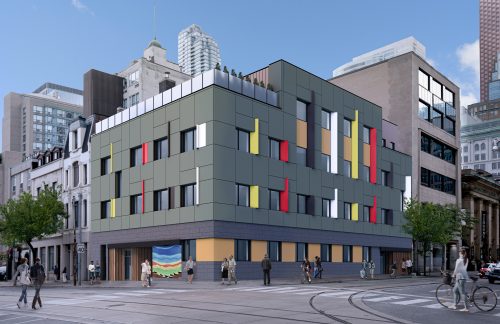
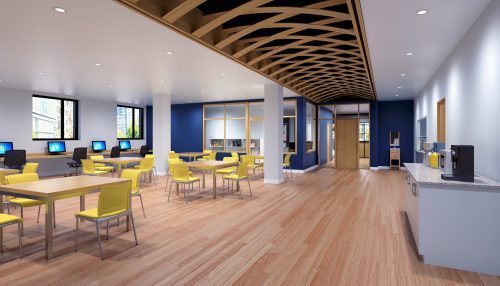
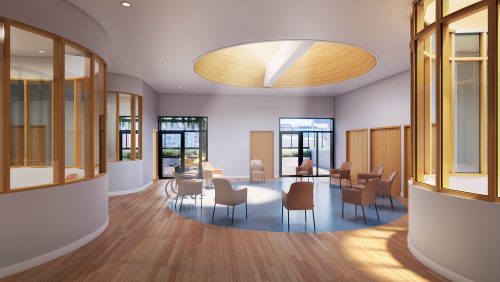
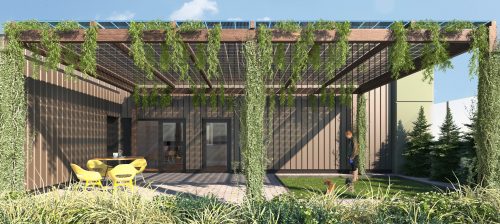
This shelter will serve anyone who identifies as Indigenous and as a man. The need for shelter space for Indigenous men has grown in the last several years. There is also a significant need for a continuum of Indigenous homelessness services that range from abstinence-based (no substance use permitted) to harm reduction-based models. This site will be the first Indigenous harm reduction shelter in the City and will support the continuum of needs that Indigenous men experiencing homelessness face.
Initial community engagement for 67 Adelaide St. E. took place in 2021 and wrapped up in early 2022. The engagement was focused on introducing the project to the community. Activities included distribution of leaflets, a virtual Community Feedback Session, meetings with key stakeholders, among other activities. The purpose of the engagement was to share information about the project and provide an opportunity for community members to ask questions and share ideas about how to welcome this service into the neighbourhood in the most effective way.
Closer to the site opening, community engagement will include additional communications and the establishment of a Community Liaison Committee (CLC). The CLC will provide resident representatives, businesses, and community organizations with an opportunity to be actively involved in identifying concerns and problem-solving challenges related to the shelter, as well as supporting the success of the shelter into the community.
A virtual community feedback session was held in November 2021 to share information about the project and provide an opportunity for community members to ask questions and share ideas about how to welcome this service into the neighbourhood in the most effective way.
Additional information about the City’s approach to working with the community is available on the community shelter integration web page.
Shelters are one of many municipal services that the City provides. Like daycares, libraries and community centres, it is important that shelters are available in neighbourhoods across Toronto. When seeking sites to support the short term need for physical distancing in the shelter system, City staff seek buildings that are available, affordable, of a suitable size and close to transit and services.
67 Adelaide St. E. is owned by the City of Toronto. Currently the location is being used as the Adelaide Women’s Resource Centre. This Centre is in the process of being relocated to 233 Carlton St. The relocation of the Adelaide Women’s Resource Centre is expected to occur in 2022/2023 after which 67 Adelaide St. E. will be renovated for Na-Me-Res and the shelter use.
As authorized by Council and City by-laws, City staff have the Delegated Authority to site new shelters in locations that meet zoning requirements before engaging with the community.
The City remains committed to working with the community to address any questions or concerns regarding the new shelter sites. For more details, please visit New Shelter Locations.
The building is being constructed to fully comply with Access for Ontarians with Disabilities Act and will be able to accommodate clients who have mobility needs. In addition to physical disabilities, clients who may have other disabilities including mental health needs, developmental or cognitive disabilities, acquired brain injuries and substance use concerns are also supported.